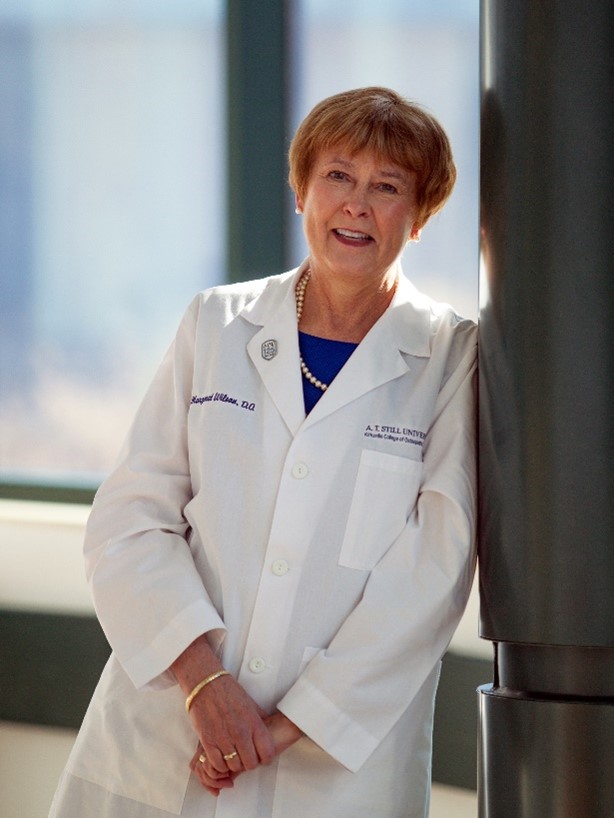
Margaret Wilson, DO
Dean, Professor Department of Family Medicine
ATSU-KCOM
What career path led you to your current academic role?
It all initially started with precepting students when I was a new-in-practice physician. One thing led to another: I became involved in teaching in the formal curriculum, which led to me becoming chair of the department. There I worked a lot on curricular development and specifically for KCOM the development of the clinical skills course (The Complete DO), SP experiences, and HPS lab. I was very fortunate to have had such a variety of things to do in my role from clinical precepting, to teacher, to administrator, to HRSA grant director while still maintaining a clinical practice. The best part was teaching in the classroom and the clinical skills labs, where I really got to interact with students and watch them grow and learn.
What does a typical day look like for you in academic medicine?
Lots of meetings! And emails! As dean much of my time is spent at both the university and national level (AACOM), serving on many committees for both. Managing departmental and staff issues, budgets, and big picture things for the college (maintaining a blemish-free accreditation is the most important duty). As chair, similarly, I dealt at that level with curricular and faculty needs. I also was program director for many HRSA grants related to curriculum and program development.
Do you still maintain a clinical practice? If so, how do you balance it with your academic responsibilities?
I do still see patients one day a week at the local federally qualified health center (FQHC) as a volunteer (I spent my entire clinical career practicing in the FHQC after completing time as a National Health Service Corps scholar in southeast Kansas). In addition to my academic roles over the years, I was also the medical director for the FQHC for 25 years. It can be hard to balance the clinical needs of my remaining patient panel, but I have a great staff of nurses that can text or call me anytime for things that crop up on the days I am not in the clinic. I make sure I check my EMR twice a day, every day, to see if anyone needs anything. I maintained my clinical practice because I love patient care--it is the core of who I am--and because I think it helps me stay current to understand the needs of the next generation of student physicians. I also have a large panel of elderly patients who really want the continuity of seeing someone they trust and are familiar with, so I did not want to abandon them. Little did I know when I took the dean’s position twelve and a half years ago that these people would still be going strong in their 90s.
How has your practice changed since you started working in an academic setting?
Obviously it is greatly reduced and I do not accept new patients in order to manage the panel I have. When I was chair of the department I still had a very busy, actively growing panel with a broader age group and did lots of in-office procedures. It was certainly manageable.
How do you manage your time between research, teaching, and seeing patients?
Time management, hmm . . . I get up early, get to campus early, and then just keep moving! Things don’t stop when I get home at night, with frequent emails coming in. Just know to take breathers when you can and prioritize the most important things to get done first. Know how and when to delegate and then let the competent people you work with do their jobs.
Get a good core of people around you and enjoy working with them. That will make the days go faster and easier.
What do you think are the biggest rewards of working in academic medicine?
Definitely seeing the next generation of physicians growing into their roles. I love meeting with alumni groups because I get to revisit so many former students. As said before, the best part of my career was the joy of teaching. The other part is feeling you really have been able to contribute to the profession which I love so much and working with a great team of people along the way. Academic medicine is fun and keeps you learning. You will never be bored. I have always loved the variety of my jobs.
How has working in an academic environment influenced your professional growth?
I never set out with a plan to have an academic career. Things just presented themselves and I willing stepped in. I have been so fortunate to be a part of it all for so many years and to have had such a varied career. It is a privilege to have been able to serve my patients and my profession.
Be open to new things and new possibilities and never box yourself in.
Do you find that students and residents impact the way you practice medicine? If so, how?
Yes, working with students and residents certainly keeps you on your toes! They challenge you to think and to stay current on evidence-based medicine. They also remind you of what is important at the end of the day, and for physicians it is the patient in front of us. They also remind us hopefully of that initial passion for medicine that led us here in the first place.
What advice would you give to medical students considering a career in academic medicine?
If you have the opportunity, get involved. Start small and if you enjoy it then expand to what is reasonable and makes sense for you. It can be such a rewarding and joyous path in medicine. Again, don’t necessarily make a plan but be open to opportunities that present to you and be willing to jump in and say yes when you are needed. A great place to start when you get out into practice is being a preceptor. If you practice near a COM see what their needs may be and see if you can fill a role in the academic setting. But be a good and committed physician first and foremost, patients need us. Don’t lose your skills.





